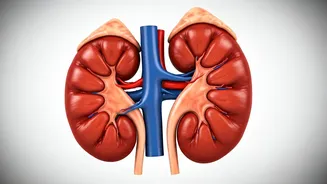Stay Hydrated Daily
Maintaining optimal hydration levels is a cornerstone of kidney health. The kidneys play a critical role in filtering waste and toxins from the blood.
Adequate fluid intake supports this process, preventing the buildup of harmful substances. Experts recommend consuming an appropriate amount of water throughout the day. Dehydration can hinder kidney function, increasing the risk of kidney stones and infections. Make it a practice to carry a water bottle and sip it regularly. Besides plain water, you can also consider incorporating hydrating foods like fruits and vegetables with high water content into your diet. Recognizing the signs of dehydration, such as dark urine, and addressing them promptly is also crucial. Staying well-hydrated is a simple but effective strategy to support your kidney's health and function.
Control Blood Pressure
Managing blood pressure is essential for kidney health. High blood pressure, or hypertension, is a leading cause of kidney damage. When blood pressure remains elevated, it can strain the blood vessels in the kidneys, gradually diminishing their ability to filter waste. Regular monitoring of blood pressure, as recommended by healthcare professionals, is essential. Making lifestyle adjustments such as adopting a heart-healthy diet, reducing sodium intake, and engaging in regular physical activity can all contribute to blood pressure control. For individuals with hypertension, adhering to prescribed medications is vital to keep blood pressure within a safe range. Regularly consulting with a doctor to monitor and manage blood pressure is crucial for protecting your kidneys from harm. Taking proactive steps to regulate blood pressure provides a strong defense against kidney disease.
Monitor Blood Sugar
Blood sugar control is another important measure for maintaining kidney health, particularly for those with diabetes. Elevated blood sugar levels can damage the blood vessels in the kidneys over time, leading to diabetic kidney disease, also known as nephropathy. Regularly monitoring blood sugar levels through frequent check-ups and adhering to the treatment plan prescribed by your healthcare provider are important steps. This often includes dietary adjustments, regular exercise, and medication as needed. Maintaining healthy blood sugar levels reduces the strain on the kidneys, preserving their function for the long term. Any changes or difficulties should be immediately reported to the doctor for timely intervention. Consistent blood sugar management is a critical preventive measure, helping to safeguard kidney health and minimizing the risk of related complications.
Eat Kidney-Friendly Foods
Adopting a kidney-friendly diet can significantly contribute to kidney health. Certain foods can put extra strain on the kidneys. Limiting your intake of processed foods, which often contain high levels of sodium, phosphorus, and potassium, is highly advisable. Focusing on fresh, whole foods that are low in these elements is beneficial. A diet rich in fruits, vegetables, and lean proteins, with portions controlled appropriately, provides the necessary nutrients while minimizing the burden on the kidneys. Consulting with a registered dietitian or healthcare provider can help create a personalized diet plan tailored to your health needs. By being mindful of food choices and prioritizing kidney-friendly options, you can actively support the health and function of your kidneys, helping them perform their critical functions effectively.
Avoid Excessive NSAIDs
The over-the-counter pain relievers known as Nonsteroidal Anti-Inflammatory Drugs (NSAIDs) should be used with caution to protect your kidneys. While these drugs can provide relief from pain and inflammation, long-term or excessive use can negatively affect kidney function. NSAIDs can constrict blood flow to the kidneys, leading to damage. Always follow the recommended dosage and duration guidelines specified on the product labels. If you need to use NSAIDs regularly, consider consulting a healthcare professional to determine safe alternatives. Be vigilant about recognizing signs of kidney problems, such as changes in urination or swelling. Taking proactive measures, such as limiting NSAID use, is a vital step in maintaining healthy kidneys. This way, you can avoid potential damage and keep your kidneys working well.
Get Regular Checkups
Routine medical checkups are essential for early detection and prevention of kidney issues. Regular checkups can help identify potential issues before they advance. These checkups usually include blood and urine tests to evaluate the kidney’s function. If you have risk factors such as diabetes, high blood pressure, or a family history of kidney disease, more frequent checkups might be necessary. By staying informed, you can receive timely interventions that prevent kidney problems from progressing. Discussing your kidney health with a doctor allows you to receive personalized advice and guidance. Regular checkups, combined with other healthy habits, provide strong support for kidney health, helping you keep these vital organs in excellent condition for years to come.


















